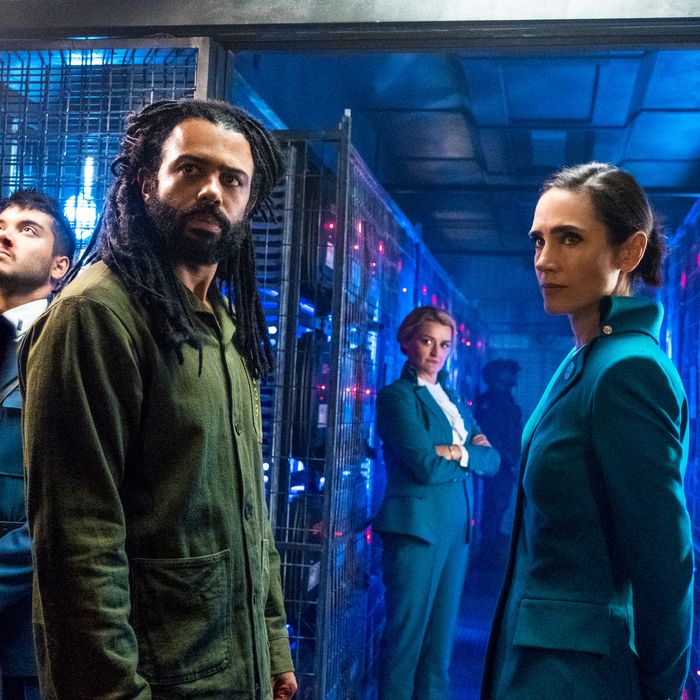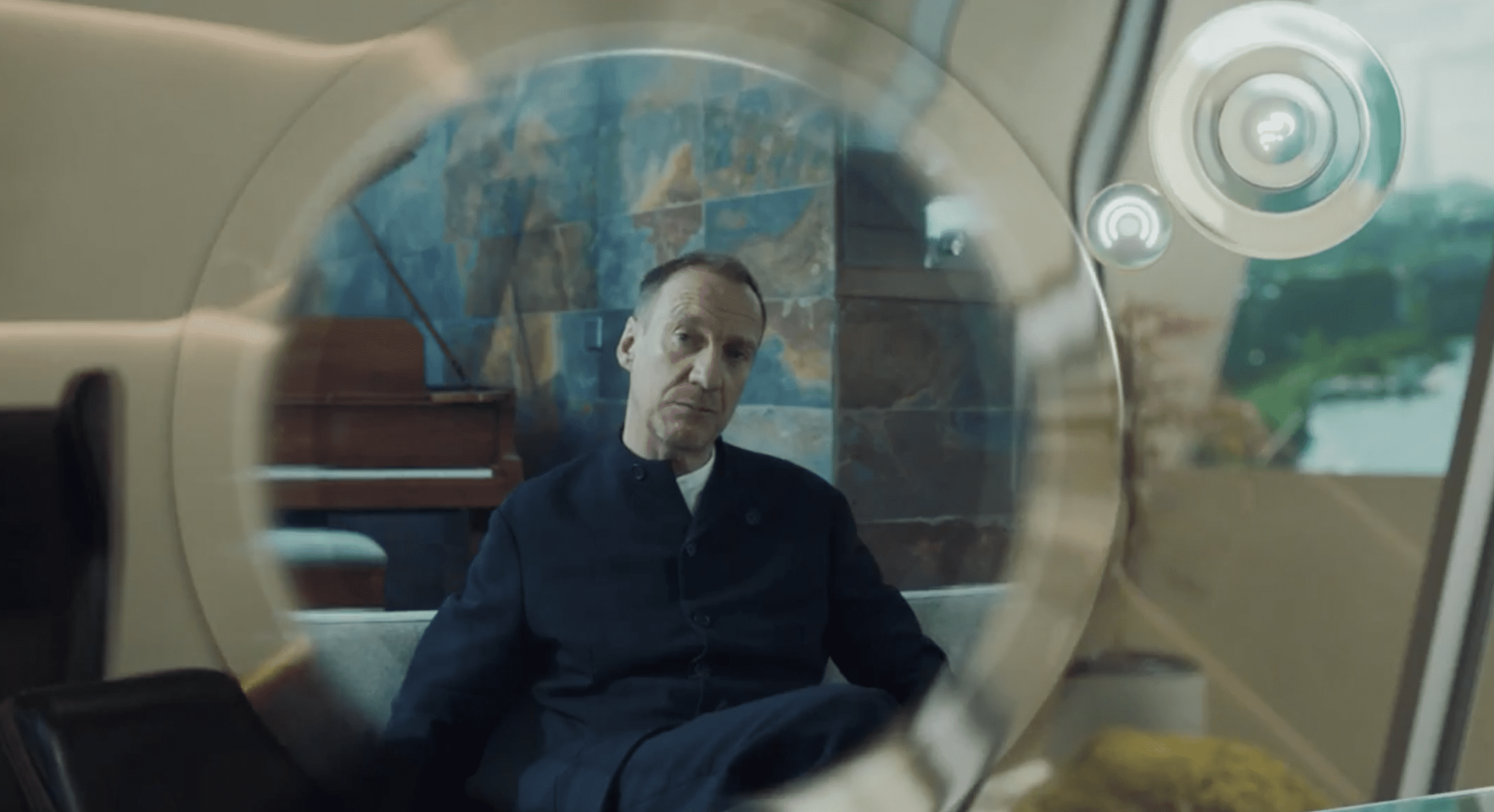from Vulture.com
https://www.vulture.com/2020/05/snowpiercer-series-premiere-recap-first-the-weather-changed.html
Snowpiercer S1 Ep 1:
First The Weather Changed
Snowpiercer Series-Premiere Recap: Murder on the Apocalypse Express
By Hillary Kelly

Photo: Justina Mintz/TNT
Snowpiercer Series-Premiere Recap: Murder on the Apocalypse Express
By Hillary Kelly

Photo: Justina Mintz/TNT
Watching Snowpiercer the show (on, of all places, TNT) versus Snowpiercer the Bong Joon Ho film, I couldn’t help but think of another little film Bong put out last year called Parasite. Perhaps you’ve heard of it. In his profile of the filmmaker, my colleague E. Alex Jung, the Bong whisperer, called Parasite “a black comedy about class differences well-suited to our season of scams”; it’s set in two homes so night-and-day different they present like a fairy tale made up by a Marxist interior designer. The Kim family lives in an infested basement apartment with one measly window overlooking a fetid alley. The Park family’s home, which the Kims essentially invade via a series of scams, is one massive window, a complex of clean lines and abundant glass so shiny they must need to employ someone to pick up all the dead, broken-necked birds. Without seeing one house, you wouldn’t recognize the true extremity of the other. The two create a sick kind of narrative balance, which Bong is asking you to want to destroy.
In the 2013 Snowpiercer film, which Bong released with Harvey Weinstein in the days of Me Too–yore, all we ever see of the titular train are the Tail, where a crew of revolutionary nonpaying customers have taken up residence and been confined, and the mechanical cars they make it through on their battle to correct the class disparity which has them locked up without daylight; sunshine is a big metaphor for Bong. (I won’t reveal what one character does see of the train in the end.) But in the series, after a brief explanation of exactly what Snowpiercer is — a train with 1,001 cars, built by the benevolent Mr. Wilford to circumnavigate the frozen Earth until it’s hypothetical thaw — and a scene depicting the Tailies storming the train at its departure, we move immediately up to first class.
The effect is jarring and necessary. We meet the smooth and collected Melanie Cavill, the head of hospitality (played by Jennifer Connelly, whom I have adored since Labyrinth and find perfecto for this role) as she glides down a sleek white corridor, only slightly nudged by the rocking that sends the Tail’s inhabitants practically tumbling to the floor. Her surroundings are luminous, like an Orient Express designed by Jony Ive. Her hair is slicked into a neat bun, her turquoise uniform (of which she has about five exact replicas hanging in her closet) perfectly molded to her figure. Her voice, when it pours out over Snowpiercer’s PA system, is so velvety it’s practically disembodied. It’s -119 degrees Celsius, she informs everyone evenly, and they’ve been on board the train for six years, nine months, and 26 days.
The purpose of this first episode is twofold. First, to lay out the class disparity so starkly that you can’t help but want those orchid-swaddled pricks in first class to choke on their lobster. Tailies are given “rations” each day, black bars of gelatinous goo, like a “drink” my 3-year-old would concoct for me if she had access to ground-up horse hooves. Melanie carries a bento box of sushi freshly plucked from a luminous train-car lagoon. The Tailies bicker over when and how to revolt. The first class passengers complain to Melanie about how the Scandinavians have taken to nude sauna visits and won’t stop singing. And yes, these are all very big, flashing-light metaphors for our own extremely messed-up class system! Ding ding ding!
Second, this episode establishes the method by which the Tailies, first-class passengers, third-class sex fiends, and Snowpiercer’s employees will begin to mix in unlikely ways. Andre Layton (Daveed Diggs, who deserves an Emmy for that grilled cheese scene) is one of the Tail’s leaders, a former homicide detective who stormed Snowpiercer and took in Miles, a young boy whose father and sister didn’t make it onto the train and whose mother was thrown off just as it started moving. He’s dedicated to the Tail’s movement to equalize treatment on board. (Remember, Snowpiercer was advertised and people bought tickets, meaning those in the Tail know some of the wonders that might await them in other classes.) The Tailies are plotting another bloody rebellion, but Layton is slow to agree: he wants more time to find out exactly what awaits them up-train.
So when he is plucked from the Tail by Ruth (Alison Wright, forever beloved as poor Martha from The Americans, but here using the full range of her English accent to play an imperious hospitality goon) to investigate the murder of a limbless, dickless third-class passenger named Sean Wise, he’s given the perfect opportunity. As he explains late in the episode, Layton sees more of the train in one day than they’d ever imagined seeing in their lifetimes.
We don’t know much about the murder yet. We learn that Sean worked in agriculture and was a, ahem, particular friend of Zara, Layton’s wife who left the Tail at some earlier juncture to work in the mysterious “Night Car” and live in third. He was found stuffed in a compartment by a Breachman (yes, that’s how that is spelled), and the M.O. of his death matches a murder committed two years earlier, a murder for which a young woman named Nikki Genelt is already serving time in “the drawers,” a set of suspended-animation facilities manned by an exceptionally creepy, Philip Seymour Hoffman–esque doctor who tends a little too lovingly to the follicular needs of his detainees.
Playing hard to get, Layton is trying to weigh out the best route forward. If he accepts the assignment, Tailies might consider him a traitor. So he demands third-class food and lodgings for all Tailies, as well as an end to the forced female sterilization that has meant no new babies for five years, in exchange for his help solving the murder. (“I guess Mr. Wilford didn’t think rich people would murder each other,” he says with the maniacal laugh of someone who knows that the wealthy are always given free passes, even in the apocalypse!) We don’t learn his complete plan until the end of the episode, when he’s sent back to talk some sense into Pike, Strong Boy, and the other rebels who have bloodily stormed one car, left a pile of jackboot bodies on the floors, and taken Till, one of the Breachman, hostage. He’ll solve the murder, he explains to his friends, as long as it gives him access to the rest of the train, where he can plot out a method for them to overthrow the system.
Why is Mr. Wilford, the proverbial Elon Musk-cum-Wizard of Oz who runs this whole enterprise, so determined to solve this murder? As Melanie explains to Layton under swaying cherry-blossom branches in one of 130 botanical cars, “a murder could upset the entire balance” of Snowpiercer, and she doesn’t just mean metaphorically. This might be the moment of Snowpiercer I loved most (after that grilled cheese, I mean, that was really *eating* a grilled cheese, right?). It’s slightly campy, definitely too on the nose, but still satisfying? Melanie holds up that single strawberry after Layton protests that the passengers have all this abundance and they can’t even share it, and she launches into her little speech. “The strawberry’s place here is commensurate with its calories,” she says, without even an ounce of self-awareness. Like any good wheel-greaser she knows the ins and outs of the system — knows that kids back in the Tail eat congealed grease all day while the fools up in first swish Cabernet around their faux refined palettes. But she has a dogma, dammit, and her own place as head of hospitality depends upon keeping everyone in their place. The first classers can only feel special if they know they have more than anyone else. It’s capitalism, baby!
Except one minor, tiny, teeny detail could upend everything. She glides into the engine room at the end of the episode, sushi in hand, and assumes the driver’s seat. “You have the train, Mr. Wilford,” the conductor says with a little smirk. The man behind the curtain is really the woman in the uniform. And she’s just barely keeping it all together.


